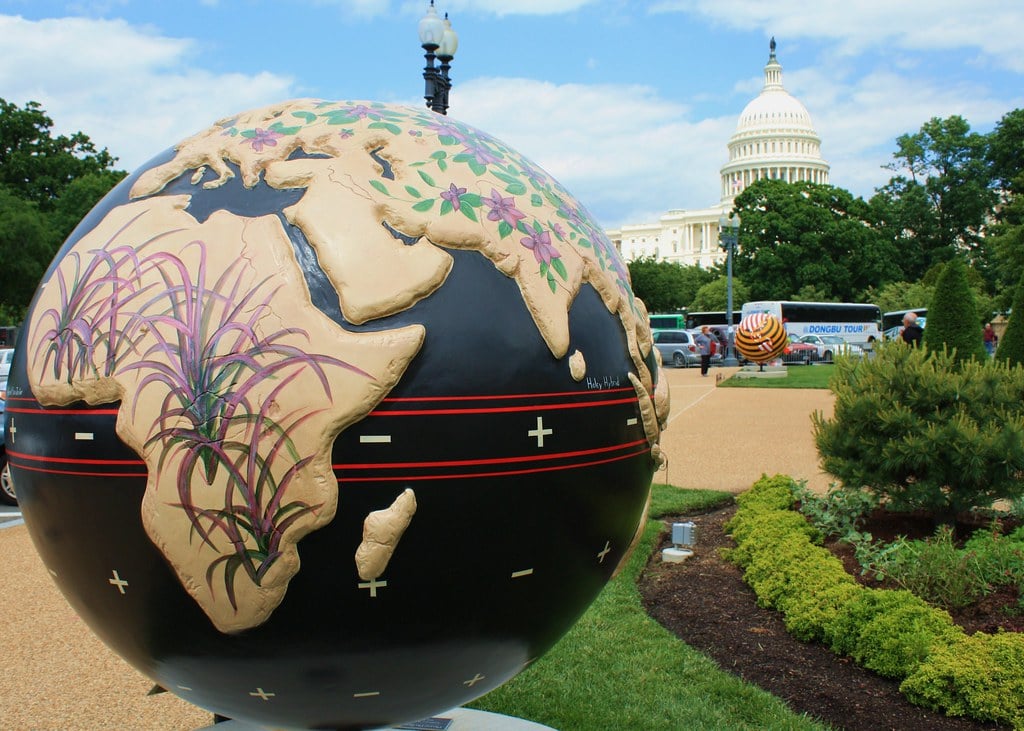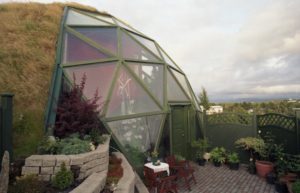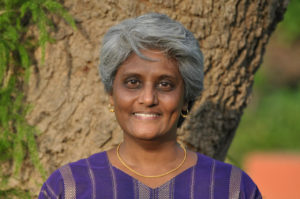
Views of Future Earth – Part IV
by Usha Alexander
[This is the eighth in a series of essays, On Climate Truth and Fiction, in which I raise questions about environmental distress, the human experience, and storytelling. It first appeared on 3 Quarks Daily. This eighth essay is divided into four parts. The seventh essay in the series, called “Our Moment on Earth”, is here.]
Restructuring Civilization
My sketch of a future world is premised upon geophysical and biospheric changes that are already well underway. And while there are, of course, uncertainties about the future, what we do know for sure is that the situation is already dire. On the matter of planetary heating, alone, we know that in 2019 the global average temperature reached 1.2ºC warmer than the pre-Industrial baseline. The UK Met Office predicts a twenty percent chance we’ll exceed the “safe” threshold of 1.5ºC for at least one year by 2024. A different analysis calculates a seventeen percent chance we’ve already exceeded the carbon budget to remain within the 1.5ºC threshold. Yet another suggests we’d exceed the extreme threshold of 2ºC by 2070, given a modest mitigation scenario in which greenhouse gas emissions don’t increase but remain the same as today. Meanwhile, the extreme effects of global warming are accelerating.

What we can surmise for certain is that our ecological crises—our sustainability crisis—will change how we live on Earth. Within the space of the irreversible damages already underway and our best efforts to avoid more catastrophic damages, it’s inevitable that we’re on the cusp of a global material and social adjustment or renewal. In the best of all remaining possible human futures, we will not continue with the climate or the lifestyle patterns of recent decades; rather, we will undergo a transition of human civilization to accommodate a new climate regime and new ways of life altered for sustainability. Because it’s not only the consequences of global warming and mass extinction that will drive extensive changes. Our most effective means of adequately mitigating global warming and other environmental degradations will themselves propel us into a new world, one in which we’re called upon to change ourselves, undertaking “unprecedented transitions in all aspects of society”, to quote the IPCC SR1.5 report from 2018, produced by an international team of scientists.
By now the most effective strategies for mitigation and adaptation recommended by the IPCC and others are widely discussed, if not as vividly imagined in their everyday repercussions: All nations must fully decarbonize and scale up renewable energy production, storage, and distribution infrastructures at a frantic pace. Just as rapidly move away from chemically intensive farming, deforestation, and destruction of wetlands. The world must identify and preserve between thirty and fifty percent of our land and sea area for untrammeled wildlife habitat. Elevate national and international priorities to construct sea barriers, water harvesting and flood management systems—the wealthier nations aiding the poorer—and also possibly thousands of massive (and as yet unproven) carbon sequestering facilities. As well as cover the costs of mounting disaster recovery and rehabilitation of displaced persons, which will stress the coffers even of wealthy governments and aid agencies. And—not least—dismantle patriarchy to slow population growth, among other excellent reasons.

All of these necessary actions, at unprecedented speed, scope, and scale will require nothing short of a material, technological, economic, and social reinvention of global culture. It requires us to change our diets: what we eat; how we grow it; where we grow it. It means moving away from meat and animal products grown on the hoof and adjusting to a different mix of locally available fruits and vegetables in any region. It will change what materials we use in construction and to fashion everyday household objects, as we jettison carbon-emitting concrete and petrochemical plastics. It will ultimately require us to recycle everything we consume in order to conserve water and curtail mining, from river sand to metals to the remaining fuel, which must be left in the ground. This in turn will alter what materials and articles we produce and how affordable everyday items remain, right down to the clothes we wear.
The changing climate and necessary lifestyle adjustments will include changes in how and where we live and build our cities, as we abandon unrecoverable infrastructure along some coastal areas. It will affect how far, how often, and the means by which we travel. All these measures will have consequences in daily living. They entail a change in what we value, how we construct and signal social status, what we expect to achieve and how we measure success in our individual lives. What kinds of jobs are available and necessary and esteemed, possibly tilting more in favor of food producers, naturalists, and social workers. Wealth and opportunity will get reshuffled as, over the coming decades, the changing planet fundamentally alters our economies, geographies, geopolitics, societies, and cultures.

Environmental degradation is ultimately driven by overconsumption. If overconsumption is equitably reduced, societies that currently enjoy the most comfortable, “first-world” standards of living with the largest per capita carbon footprints will be the ones who feel their way of life most egregiously altered or curtailed, and those profiting most immediately from the present status quo will be dethroned from their apogees of wealth and power. However, if we don’t undertake adequate measures, the burden will fall first and worst upon the world’s low-income communities and nations. Given this equation, it’s no mystery at all why no meaningful mitigation has yet been undertaken—and likely will continue to be forestalled: privileged individuals and nations are unlikely to vote for policies that dampen their present experience of prosperity. Yet in a scenario where we don’t act aggressively to slow the warming, stanch pollution, and reverse habitat destruction, our world will be increasingly rapidly destabilized, and even the well-off will soon find themselves unable to continue as they are.
Just how much, how fast, and which consequences are more extremely felt by whom depends upon what we as a human community elect and are able to do. Yet too many of us with the most to sacrifice—for it does entail sacrifice by overconsumers—resist the transition. They do so by refusing to acknowledge the need for fundamental socioeconomic change, casting it as unspeakable apocalypse, by deflecting dialog away from deeper changes that are required toward the superficial technical fixes. They limit themselves to arguing about solar versus nuclear power rather than also challenging our culture built around growth economics. But technical fixes alone will never be sufficient to achieve civilizational sustainability. And a deliberate civilizational transition is our best hope to prevent the more apocalyptic scenarios that could actually result from our inaction. The hope—if we can navigate it justly and effectively—is the revival and sustenance of clean air, clean water, wholesome food, and more healthful and equitable living among ourselves and with the planet.
So as the onrushing planetary changes erode the modes of life we presently cling to, we must adapt our lives to more sustainable practices. To do our best, we must squarely face the uncertainty and distress that our predicament presents, recognize the systemic problems, and change the way we collectively live and work, produce and consume. This means disabusing ourselves of our present vainglorious narratives of entitlement. It means dreaming, instead, new stories that kindle new visions of hope, a hope invested not in a “business as usual” future, bedecked with solar panels, but rather in a salutary and equitable transition to new ways of living and thinking and being. For this is the only hope. As Antónia Guterres, the UN Secretary-General, has put it, “Making peace with nature is the defining task of the 21st century.”

Usha Alexander was born to Indian immigrants who came to the United States in the 1950s and settled in the very small town of Pocatello, Idaho. She ran away to university at the age of 19, and later joined the US Peace Corps, where she served as a science teacher in the archipelago nation of Vanuatu. In the late 90s, Usha made her way to the San Francisco Bay Area of California, where she settled and worked for Apple Computer for many years.
Since 2013, Usha resides with her partner, writer and photographer, Namit Arora, in the National Capital Region of India. Usha has lived in four different countries and has learned to carry her home within herself, yet she frequently returns to the CA Bay Area with a certain sense of homecoming.